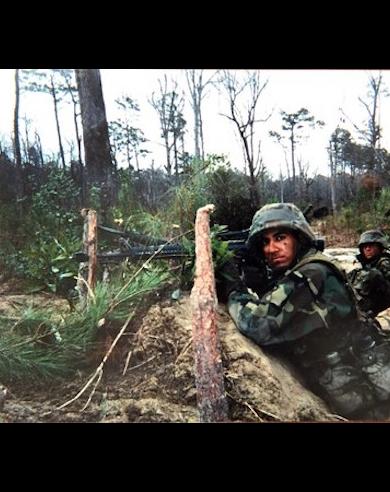Leader Spotlight: Mansoor Shams
As part of United Religions Initiative North America’s #TangibleHope campaign, Veterans for American Ideals is recognizing veteran leaders who are continuing their service by building unity and standing up for American values. Through a series of interviews, we’re asking VFAI leaders to share more about how their service shaped them and what responsibility they feel veterans have to speak up on issues that relate to our national ideals.
Today’s interview is with Mansoor Shams, a U.S. Marine veteran and Muslim American who created MuslimMarine.org to combat stereotypes and bigotry.
Tell me about your military service.
I joined on Halloween night 2000. I had a difficult childhood—I came from a broken home and life was a struggle. I wanted to become my own man and stand up on my own two feet. I ran across some recruiters and took an interest in the Marine Corps.
When I joined, I never thought about whether I was doing something wrong or weird or in conflict with my identity as a Muslim American. Loyalty to country of residence is something that was taught as part of my Muslim faith.
Today people raise questions regarding Muslim loyalty to America—I find this crazy because if they had better understanding and knowledge of the Islamic faith they'd realize that being a Muslim, an American, a U.S. Marine all at the same time is quite possible. I'm a living example of it. Simply stated, there's no conflict of interest in being a Muslim, an American, and U.S. Marine. That's why I'm proud.
How did your service shape the person you are today?
Life is complex; we’re all just trying to figure out our path. That is a constant battle we’re all fighting: in our faith, in our professional and personal lives. The fact that I have a platform today, simply because I am a Muslim, an American, and a Marine veteran, is baffling to me. I never would have imagined that we would reach a point where I would have to talk about my service and my faith as not being in conflict with one another.
As a veteran, what sort of responsibility do you feel to speak up on issues that relate to American ideals?
My goal is to bring Americans back to their internal moral compass. Regardless of faith, we all have something deep inside of us that guides us on whether or not we’re doing the right thing. It’s innate in human nature. I want people to reconnect with that.
In the last year, many things said by politicians about Muslims and the Islamic faith are nowhere close to being in line with American values. What makes America great is its diversity. I was just overseas, and there are all sorts of restrictions on others in some countries. In some places, you can work in a country your whole life but never be a citizen, never have the same rights as their citizens. Those countries probably thought that was a great way to protect their people.
America, however, did the opposite: it embraced everyone. And look how powerful America is! This nation is what it is today because of diversity and our embrace of that diversity. Look at our engineers, our doctors—consider your iPhone, the product of a son of Syrian refugees.
Today the world looks to America as an example, a beacon to follow. I travel a lot and I see that. But lately, it’s like we’ve gone back to the Ice Age. I asked everyone on a recent trip through Arab countries about what they’ve been seeing and hearing in this U.S. political season. So much respect for our nation has been lost, and I think that’s unfortunate. People don’t realize what we’ve had here.
Tell me about one issue related to those ideals that is of particular importance or concern to you right now. What are you doing about it?
One issue that I want to highlight is related to racism and bigotry. Often when someone sees a guy who looks like me—who has brown skin, who keeps a beard—they automatically think “terrorist.” What I want to do is break that mentality. That’s what I’m doing through MuslimMarine.org: I’m telling people that a guy who looks like me is your neighbor, a United States Marine.
When someone signs up to join the military, their life is no longer their own. Whether you die or not, whether you fight in combat or not—you were courageous for simply signing on that dotted line and telling your country that you’re at its service. That guy you may have thought was a terrorist or simply associate with terrorism may actually have been someone who was willing to lay down his life for you.
What would you say to other veterans about the role that they can play in these issues as citizens?
As veterans, we’ve played a tiny part in the grand scheme of things, just by signing on that dotted line. Your role now is to help people understand that this is a diverse nation: there is no religious test. This is what you signed up for—to protect this, so that those who come after us can also enjoy these freedoms. It comes back to our core values. We are all one people and what makes us strong is standing together in unity.


